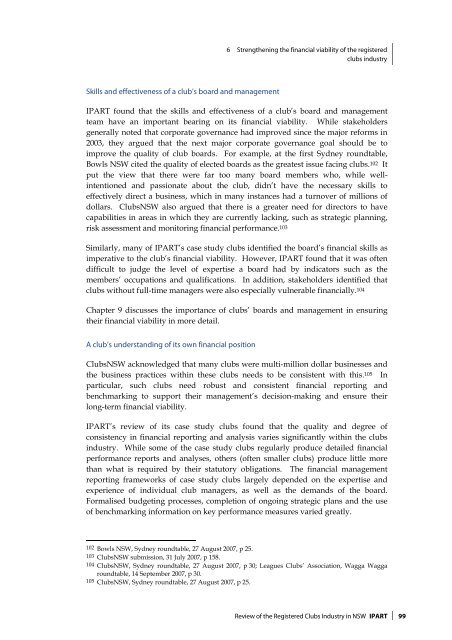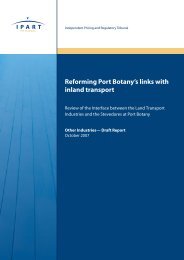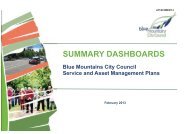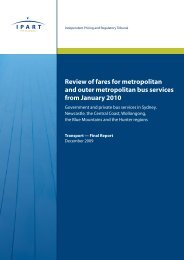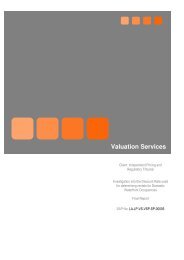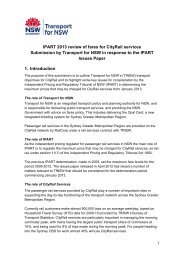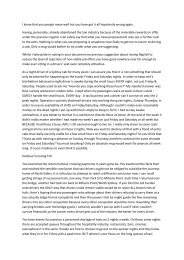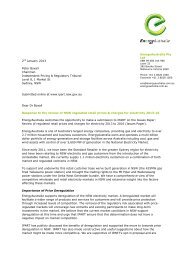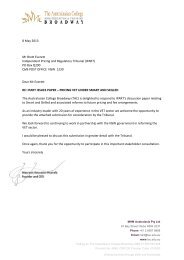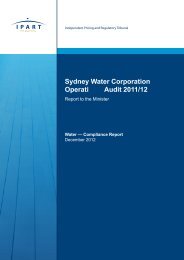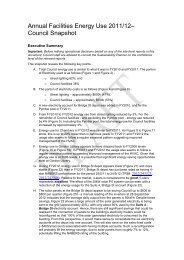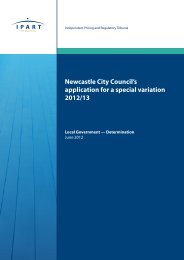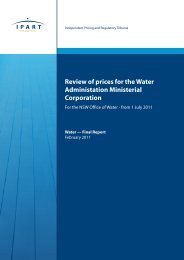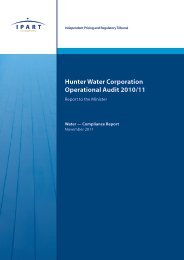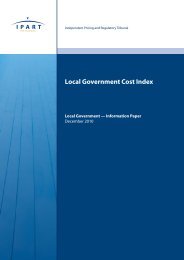Review of the Registered Clubs Industry in NSW - Clubs NSW
Review of the Registered Clubs Industry in NSW - Clubs NSW
Review of the Registered Clubs Industry in NSW - Clubs NSW
You also want an ePaper? Increase the reach of your titles
YUMPU automatically turns print PDFs into web optimized ePapers that Google loves.
6 Streng<strong>the</strong>n<strong>in</strong>g <strong>the</strong> f<strong>in</strong>ancial viability <strong>of</strong> <strong>the</strong> registered<br />
clubs <strong>in</strong>dustry<br />
Skills and effectiveness <strong>of</strong> a club’s board and management<br />
IPART found that <strong>the</strong> skills and effectiveness <strong>of</strong> a club’s board and management<br />
team have an important bear<strong>in</strong>g on its f<strong>in</strong>ancial viability. While stakeholders<br />
generally noted that corporate governance had improved s<strong>in</strong>ce <strong>the</strong> major reforms <strong>in</strong><br />
2003, <strong>the</strong>y argued that <strong>the</strong> next major corporate governance goal should be to<br />
improve <strong>the</strong> quality <strong>of</strong> club boards. For example, at <strong>the</strong> first Sydney roundtable,<br />
Bowls <strong>NSW</strong> cited <strong>the</strong> quality <strong>of</strong> elected boards as <strong>the</strong> greatest issue fac<strong>in</strong>g clubs. 102 It<br />
put <strong>the</strong> view that <strong>the</strong>re were far too many board members who, while well<strong>in</strong>tentioned<br />
and passionate about <strong>the</strong> club, didn’t have <strong>the</strong> necessary skills to<br />
effectively direct a bus<strong>in</strong>ess, which <strong>in</strong> many <strong>in</strong>stances had a turnover <strong>of</strong> millions <strong>of</strong><br />
dollars. <strong>Clubs</strong><strong>NSW</strong> also argued that <strong>the</strong>re is a greater need for directors to have<br />
capabilities <strong>in</strong> areas <strong>in</strong> which <strong>the</strong>y are currently lack<strong>in</strong>g, such as strategic plann<strong>in</strong>g,<br />
risk assessment and monitor<strong>in</strong>g f<strong>in</strong>ancial performance. 103<br />
Similarly, many <strong>of</strong> IPART’s case study clubs identified <strong>the</strong> board’s f<strong>in</strong>ancial skills as<br />
imperative to <strong>the</strong> club’s f<strong>in</strong>ancial viability. However, IPART found that it was <strong>of</strong>ten<br />
difficult to judge <strong>the</strong> level <strong>of</strong> expertise a board had by <strong>in</strong>dicators such as <strong>the</strong><br />
members’ occupations and qualifications. In addition, stakeholders identified that<br />
clubs without full-time managers were also especially vulnerable f<strong>in</strong>ancially. 104<br />
Chapter 9 discusses <strong>the</strong> importance <strong>of</strong> clubs’ boards and management <strong>in</strong> ensur<strong>in</strong>g<br />
<strong>the</strong>ir f<strong>in</strong>ancial viability <strong>in</strong> more detail.<br />
A club’s understand<strong>in</strong>g <strong>of</strong> its own f<strong>in</strong>ancial position<br />
<strong>Clubs</strong><strong>NSW</strong> acknowledged that many clubs were multi-million dollar bus<strong>in</strong>esses and<br />
<strong>the</strong> bus<strong>in</strong>ess practices with<strong>in</strong> <strong>the</strong>se clubs needs to be consistent with this. 105 In<br />
particular, such clubs need robust and consistent f<strong>in</strong>ancial report<strong>in</strong>g and<br />
benchmark<strong>in</strong>g to support <strong>the</strong>ir management’s decision-mak<strong>in</strong>g and ensure <strong>the</strong>ir<br />
long-term f<strong>in</strong>ancial viability.<br />
IPART’s review <strong>of</strong> its case study clubs found that <strong>the</strong> quality and degree <strong>of</strong><br />
consistency <strong>in</strong> f<strong>in</strong>ancial report<strong>in</strong>g and analysis varies significantly with<strong>in</strong> <strong>the</strong> clubs<br />
<strong>in</strong>dustry. While some <strong>of</strong> <strong>the</strong> case study clubs regularly produce detailed f<strong>in</strong>ancial<br />
performance reports and analyses, o<strong>the</strong>rs (<strong>of</strong>ten smaller clubs) produce little more<br />
than what is required by <strong>the</strong>ir statutory obligations. The f<strong>in</strong>ancial management<br />
report<strong>in</strong>g frameworks <strong>of</strong> case study clubs largely depended on <strong>the</strong> expertise and<br />
experience <strong>of</strong> <strong>in</strong>dividual club managers, as well as <strong>the</strong> demands <strong>of</strong> <strong>the</strong> board.<br />
Formalised budget<strong>in</strong>g processes, completion <strong>of</strong> ongo<strong>in</strong>g strategic plans and <strong>the</strong> use<br />
<strong>of</strong> benchmark<strong>in</strong>g <strong>in</strong>formation on key performance measures varied greatly.<br />
102 Bowls <strong>NSW</strong>, Sydney roundtable, 27 August 2007, p 25.<br />
103 <strong>Clubs</strong><strong>NSW</strong> submission, 31 July 2007, p 158.<br />
104 <strong>Clubs</strong><strong>NSW</strong>, Sydney roundtable, 27 August 2007, p 30; Leagues <strong>Clubs</strong>’ Association, Wagga Wagga<br />
roundtable, 14 September 2007, p 30.<br />
105 <strong>Clubs</strong><strong>NSW</strong>, Sydney roundtable, 27 August 2007, p 25.<br />
<strong>Review</strong> <strong>of</strong> <strong>the</strong> <strong>Registered</strong> <strong>Clubs</strong> <strong>Industry</strong> <strong>in</strong> <strong>NSW</strong> IPART 99


